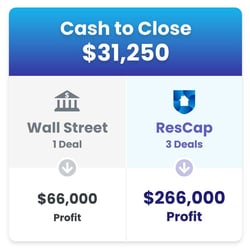
Down payments are typical in private lending. Real estate investors usually accept down payments as a necessary part of financing their rehab, focusing instead on finding the lowest rate. But your down payment has a huge impact on your business. Down payments leave you cash poor in a cash intensive game.
Here are the top reasons why private loans with a down payment are bad for business, and why you’re better off with a balance sheet lender that doesn’t require them.
 More Working Capital to Invest In More Properties
More Working Capital to Invest In More Properties
Even the veterans in this business feel poor when all their cash walks out the door towards down payment after down payment. That feeling is justified. Because using the exact same amount of cash to close, you can fund more deals with a lender that doesn’t require a down payment. It’s called the multiplier effect.
As you can see in the example graphic, the same amount of cash to close with a private lender selling your loan to Wall Street allows you to close three times as many deals with lenders not requiring a down payment.
In this scenario, the rate and points you pay per deal has a smaller impact on your bottom line than your ability to close more deals overall.
Cash Reserves for the Unexpected
We’ve all been there: the HVAC system that fails post-inspection. Mold found in the walls mid-rehab. A burst pipe after a hard freeze. Unexpected expenses are inevitable. Even the most seasoned investors still encounter surprises after closing. Staying cash flush gives you the peace of mind that whatever happens, you’ll be able to cover the damage. You’ll never get sidelined because you have a healthy cash reserve.
An Unsullied Rate of Return
Putting less money into deals increases the rate of return that you get on each project. So, if you’re measuring your success as an investor by your rate of return per acquisition or per flip, wouldn’t you want the rate of return to be as high as possible?
If you’re serious about earning the highest rate of return on every single deal, then 100% financing is going to mean a great deal to you.
Ignore the Pin Stripes
One theory for why the New York Yankees adopted pin stripes (aside from making Babe Ruth appear slimmer) was that they were a distraction for the other team. The competition couldn’t keep their eye on the ball.
If the ball in the context of house flipping is your business’s profitability, lenders selling their loans to Wall Street use interest rates like the Yankees used pin stripes. Investors get so distracted chasing rates that they miss the bigger picture: that loans without a down payment keep your cash reserves flush, allow you to close more deals, and make you more profitable overall.
This is why it’s so critical to work with a balance sheet lender not beholden to Wall street and to understand what your fix-and-flip loan terms actually mean. Never mind the pin stripes: not having a down payment will impact your bottom line greater than rate.

![]() Down with the Down.
Down with the Down.



